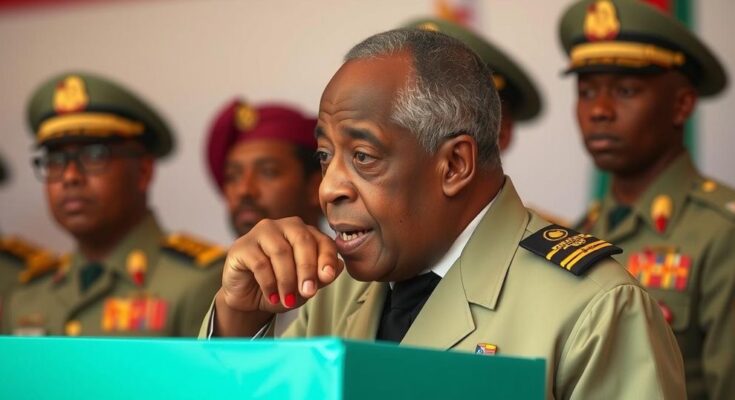Chad voted in a general election aimed at ending military rule, but turnout was predicted to be low due to an opposition boycott. Election officials reported a 38% turnout, while the ruling party’s candidates seemed favored amidst allegations of pre-determined results. The elections are seen as pivotal for Chad’s transition to democracy, following years of military governance and ongoing security issues.
Chad held a general election on Sunday, a crucial event that the government claims marks a transition away from military rule. Voter turnout was anticipated to be low, as opposition groups encouraged citizens to boycott the election, leading to midday turnout figures of only 38 percent for parliamentary and local council positions. Election officials attributed this apathy to unfavorable weather conditions, but opposition leader Succes Masra insisted that most voters heeded their call to abstain, asserting that the election results had already been pre-determined.
The boycott seemingly favors candidates associated with President Mahamat Idriss Deby Itno, who assumed power following a military takeover in 2021 and subsequently faced accusations of conducting illegitimate elections. Deby, in an effort to galvanize that electorate, urged voters to participate, touting the day as historic and sharing his voting experience on social media. However, many citizens expressed skepticism about the electoral process, with one individual calling voting pointless due to the lack of genuine democratic practices in Chad.
In the days leading to the election, a report emerged regarding the disappearance of over a thousand ballots intended for Bongor, prompting opposition leaders to demand vigilance against alleged fraud networks orchestrated by the ruling party. Despite logistical voting accommodations made for military personnel and nomadic groups, Chad’s elections occurred amid pressing challenges, including security threats from Boko Haram and heightened tensions following a military agreement termination with France.
The elections are framed by the government as the final step toward restoring democracy in Chad, following the lengthy reign of Deby’s father. Amid allegations of vote rigging and systemic issues affecting citizens, the outcome of these elections could define the country’s political trajectory and the government’s ability to fulfill promises of democratic reforms.
Chad has experienced political instability, particularly following the death of long-time ruler Idriss Deby in 2021. His son, Mahamat Idriss Deby Itno, led a military coup, promising a transition to democracy that many citizens and opposition parties regard with skepticism. The general election held on Sunday is intended to restore a civilian government after three years of military rule. However, pervasive allegations of electoral fraud and boycotts from significant political factions complicate the legitimacy of this process. Moreover, the national security situation, including ongoing conflicts in neighboring regions, further exacerbates the country’s challenges during this pivotal electoral moment.
The recent general election in Chad represents a critical juncture in the nation’s political landscape, with a focus on transitioning from military governance to a civilian-led government. Despite official claims of record turnouts and a call for public participation, the overwhelming response from the opposition to boycott underscores a deep mistrust in the electoral integrity. As the aftermath of this election unfolds amidst security threats and regional turmoil, the ramifications on Chad’s governance and prospective reforms will be closely monitored, determining the future of its democratic aspirations.
Original Source: www.wyomingnewsnow.tv




